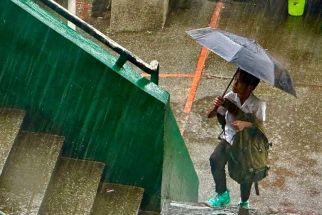12 government troopers slain in NPA’s Samar attack
February 13, 2001 | 12:00am
Communist guerrillas attacked an Army patrol base in Samar yesterday, killing 11 soldiers and a government militiaman, the military said.
The military said "a large number" of New People’s Army (NPA) guerrillas swooped down on the Army outpost before dawn in the village of Babaclayun in San Jose de Buan town, triggering a fierce clash.
Two soldiers survived the attack and said that despite tenaciously defending the outpost, they were outnumbered by the NPA rebels.
Reinforcements were immediately dispatched to the area backed by two attack helicopters to pursue the fleeing guerrillas.
The attack came on the same day a clash occurred in Iloilo, in which three guerrillas, one of them a 15-year-old, were killed and a rebel leader, Reynaldo Bocala, 55, was wounded and captured. Bocala is the deputy secretary of the Panay Regional Party Committee.
The 30-minute firefight occurred in Barangay Tabiak at the boundary of Tubungan and Igbaras towns.
The fresh violence came three days after the government announced the composition of a negotiating panel that would resume formal peace talks with the Communist Party of the Philippines (CPP) this year.
In Antipolo City, meanwhile, at least 40 NPA rebels torched vehicles in a compound in Barangay Calawis over the weekend.
Police said the rebels claimed that the vehicles’ owner, a certain Alfredo Malvar, heads a landgrabbing syndicate.
It was not clear how the attacks would affect the upcoming talks, but the government had earlier promised to release several communist guerrillas from detention as a confidence-building measure.
The rebels, in turn, promised to free Army Maj. Noel Buan and police Chief Inspector Abelardo Martin whom they abducted in 1999.
Earlier Monday, Defense Secretary Eduardo Ermita said he considered the CPP’s armed wing, the New People’s Army (NPA), as a major threat despite the upcoming talks.
"The military assessed that the communist rebels will still stage more ambuscades against government targets in isolated places but will also lay low in anticipation of the resumption of talks," Ermita said.
Talks with the rebels collapsed in 1999 after the communists protested the Senate’s ratification of the Visiting Forces Agreement with the United States, which they claimed could be used by the government in its anti-insurgency drive. — Ulysses Torres Sabuco, Paolo Romero, Non Alquitran and Leo Solinap
The military said "a large number" of New People’s Army (NPA) guerrillas swooped down on the Army outpost before dawn in the village of Babaclayun in San Jose de Buan town, triggering a fierce clash.
Two soldiers survived the attack and said that despite tenaciously defending the outpost, they were outnumbered by the NPA rebels.
Reinforcements were immediately dispatched to the area backed by two attack helicopters to pursue the fleeing guerrillas.
The attack came on the same day a clash occurred in Iloilo, in which three guerrillas, one of them a 15-year-old, were killed and a rebel leader, Reynaldo Bocala, 55, was wounded and captured. Bocala is the deputy secretary of the Panay Regional Party Committee.
The 30-minute firefight occurred in Barangay Tabiak at the boundary of Tubungan and Igbaras towns.
The fresh violence came three days after the government announced the composition of a negotiating panel that would resume formal peace talks with the Communist Party of the Philippines (CPP) this year.
In Antipolo City, meanwhile, at least 40 NPA rebels torched vehicles in a compound in Barangay Calawis over the weekend.
Police said the rebels claimed that the vehicles’ owner, a certain Alfredo Malvar, heads a landgrabbing syndicate.
It was not clear how the attacks would affect the upcoming talks, but the government had earlier promised to release several communist guerrillas from detention as a confidence-building measure.
The rebels, in turn, promised to free Army Maj. Noel Buan and police Chief Inspector Abelardo Martin whom they abducted in 1999.
Earlier Monday, Defense Secretary Eduardo Ermita said he considered the CPP’s armed wing, the New People’s Army (NPA), as a major threat despite the upcoming talks.
"The military assessed that the communist rebels will still stage more ambuscades against government targets in isolated places but will also lay low in anticipation of the resumption of talks," Ermita said.
Talks with the rebels collapsed in 1999 after the communists protested the Senate’s ratification of the Visiting Forces Agreement with the United States, which they claimed could be used by the government in its anti-insurgency drive. — Ulysses Torres Sabuco, Paolo Romero, Non Alquitran and Leo Solinap
BrandSpace Articles
<
>
- Latest
- Trending
Trending
Latest
Trending
Latest
Recommended






























